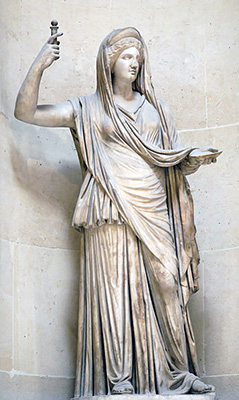Also on this page:
Greek Goddess Names,
Greek Goddesses Names,
More Mythology Topics
More Topic Categories
Greek Goddesses
 In Ancient Greek mythology, there were numerous gods and goddesses, minor and major, living in woods, rivers, mountain peaks, etc. Probably the best – known of them all are the Olympians, also known as the Dodekatheon (Dodeka > twelve, theon > gods).
In Ancient Greek mythology, there were numerous gods and goddesses, minor and major, living in woods, rivers, mountain peaks, etc. Probably the best – known of them all are the Olympians, also known as the Dodekatheon (Dodeka > twelve, theon > gods).The names of the female goddesses belonging to the Dodekatheon are Hera, Demeter, Artemis, Athena, and Aphrodite. Hestia and Persephone are also occasionally included. Hera was the Queen of the Gods and Goddess of marriage and family. She was the youngest daughter of Cronus and Rhea, both wife and sister of Zeus. As she was the Goddess of marriage, she always tried to get revenge on Zeus’ lovers and children. Demeter was the Goddess of fertility, agriculture and nature, the middle daughter of Cronus and Rhea. Artemis was the Goddess of the hunt, virginity, archery and the moon. She was the daughter of Zeus and Leto, twin sister of Apollo. Athena was the Goddess of wisdom, defense and strategic warfare. She was the daughter of Zeus and the Oceanid Metis, and she was born fully grown and in full armor out of her father’s head after he swallowed her mother. Aphrodite was the Goddess of love and beauty, daughter of Zeus and the Oceanid Dione. She was married to Hephaestus, but had many lovers, the most notable being Ares.
Before the Olympians settled in Mount Olympus, other Gods reigned over the region of Greece. The primordial Greek gods were the earliest beings in existence, the origins of the later generations of Greek Gods, and were created by Chaos. According to Hesiod’s Theogony, the female primordial Greek gods are Chaos, Nyx, Hemera and Gaia; other female deities, not born by Chaos, include Ananke, Thesis, Physis, the Nesoi and Thalassa. Chaos is the mother of the Primordial Gods, and is depicted as an empty void. Nyx represents night, while Hemera is day; they are sisters to Erebus (darkness) and Aether (light) respectively. Gaia, the sister of Chaos, represents Mother Earth. Ananke is compulsion, while Thesis represents Creation and Physis is Nature. Finally, the Nesoi are the female goddesses of the Islands, and Thalassa is the Sea.
The Primordial Gods were replaced by the Titans, children of Uranus (god of the Sky) and Gaia (goddess of the Earth) that ruled during the first Age of Men, the Golden Age. The female Titanesses were Mnemosyne, Tethys, Theia, Phoebe, Rhea and Themis. Mnemosyne was the personification of memory, mother of the nine Muses, while Tethys was an aquatic sea goddess, mother of the chief rivers known to the Greeks, such as the Nile, the Alpheus, and the Maeander. Theia, also called Euryphaessa, may have been a goddess of the light. Phoebe, on the other hand, was considered the Goddess of the moon; her grandchildren were the Olympians Apollo and Artemis, both of them also having the name Phoebus and Phoebe respectively. Rhea was known as the mother of gods, as she gave birth to the Olympians. Finally, Themis is described as “of good counsel”, the embodiment of divine order, law and custom.
See Also:
 Athens Photos
Athens Photos
 Santorini Photos
Santorini Photos
 Crete Photos
Crete Photos
 Meteora Photos
Meteora Photos
 Corfu Photos
Corfu Photos

